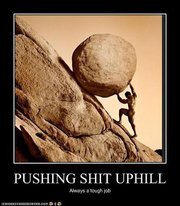Says Peter on the new look homepage, quoting a certain E Hemingway.
Yes, and the first, and quite likely the second and third, speaking for myself. I had quite a breather after the first draft of the completed novel. I had heartening feedback, including from a writer I admire, Sophie Hannah, and I had negative feedback; and family members were the harshest. I have rellies who read a lot and they don't pull their punches. Someone might even have said the words, Enid Blyton at one point, in speaking of errors of tone, when I was writing for adults and/or, what is this new bracketing now, new adults.
at one point, in speaking of errors of tone, when I was writing for adults and/or, what is this new bracketing now, new adults.
I resisted the passing impulse to self harm, and sat digesting all this awhile, working out how to move the first draft forward, and I wrote seven drafts before I felt confident enough, by which I also mean, proud enough, to send my paper boat off down the river.
No-one was waiting for it. I could afford to take my time; I had other work to attend to, but what if I'd been locked into a contractual obligation to deliver by a certain date? Might this not come with success?
I suspect though, as well as hope, now that I'm on with another first draft, that while a first draft will still be crappy when it's your second first draft, it won't be quite as steamingly crappy as your first first draft. You have served an apprenticeship of discipline, no? in completing a first full length manuscript. You have learned more about the control of language than you quite appreciated as a reader.
Organic gestation of a book is a luxury. Maybe we'll never know till we're tested, just how fast we could go and how good a first draft could be, should it become business, and someone is waiting on that product and will freeze in a gutter because they can't pay their bills if we fail. Or we won't be able to pay ours. I exaggerate of course, but that's what we do, innit. Books are cartoons of reality.
We know the odds are stacked against the reading world taking our book to its heart. Still, the pantheons purr like...well, not like panthers, obviously. But we have decided we want to do this.
I deduce the folk here, and this includes @AgentPete are all pig-stubborn.

Yes, and the first, and quite likely the second and third, speaking for myself. I had quite a breather after the first draft of the completed novel. I had heartening feedback, including from a writer I admire, Sophie Hannah, and I had negative feedback; and family members were the harshest. I have rellies who read a lot and they don't pull their punches. Someone might even have said the words, Enid Blyton
I resisted the passing impulse to self harm, and sat digesting all this awhile, working out how to move the first draft forward, and I wrote seven drafts before I felt confident enough, by which I also mean, proud enough, to send my paper boat off down the river.
No-one was waiting for it. I could afford to take my time; I had other work to attend to, but what if I'd been locked into a contractual obligation to deliver by a certain date? Might this not come with success?
I suspect though, as well as hope, now that I'm on with another first draft, that while a first draft will still be crappy when it's your second first draft, it won't be quite as steamingly crappy as your first first draft. You have served an apprenticeship of discipline, no? in completing a first full length manuscript. You have learned more about the control of language than you quite appreciated as a reader.
Organic gestation of a book is a luxury. Maybe we'll never know till we're tested, just how fast we could go and how good a first draft could be, should it become business, and someone is waiting on that product and will freeze in a gutter because they can't pay their bills if we fail. Or we won't be able to pay ours. I exaggerate of course, but that's what we do, innit. Books are cartoons of reality.
We know the odds are stacked against the reading world taking our book to its heart. Still, the pantheons purr like...well, not like panthers, obviously. But we have decided we want to do this.
I deduce the folk here, and this includes @AgentPete are all pig-stubborn.


